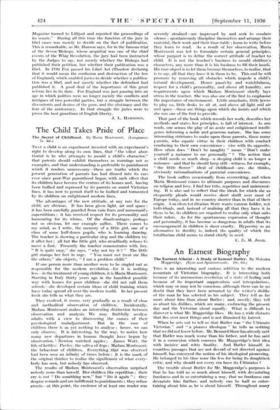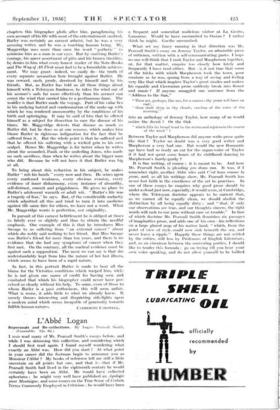An Earnest Biography
Tans is an interesting and curious addition to the modem .mountain of Victorian_ biography. It is interesting both because of its unconscious revelation of a state of feeling and because " of its important suppressions and interpolations, .which may or may not be conscious, although there can be no .doubt that they have been actuated by the writer's dislike of the man he has selected as his subject. They tell us far more about him than about Butler ; and, mostly, they tell as about his dislikes, which are many, embracing the present day and the Victorian about equally. What is difficult to discover is what Mr. Muggeridge likes. He has a wide distaste that lies over most things and is not illumined by hatred.
When he sets out to tell us that BUtler was " the Ultimate Victorian " and " a pioneer ideologue he tells us nothing that we did not know before. Mr. Bernard Shaw has already said that Butler was much worse than his father, and he has said it in- a connexion which -conveys Mr. Muggeridge's first idea with incisive and witty finality. And Butler himself, in countless -passages that are not devoid of wit directed against himself, has conveyed the notion of his ideological pioneering. He belonged to his time none the less for being its doughtiest critic, and. why should not every era have its Ultimates ?
The trouble about Butler for Mr. Muggeridge's purposes is that he has told Us so much about himself, with devastating frankness and in so entertaining a way, that no frankness can devastate him further; and nobody can be half so enter- taining about him as he is about himself. Throughout many chapters this biographer plods after him, paraphrasing his own account of his life with most of the entertainment omitted: Butler' Was certainly an earnest atheist, but he was. a very amusing writer, and he was a touching human being. Mr., lituggeridge uses more than once the word pathetic to minimise him as a man in our eyes. But by omitting Butler's courage, his queer assortment of gifts and his brazen timidity,. he denies to him what every honest reader of the Note-Books. Arid The Way of All Flesh must feel to be a formidable achieve-. went. We may grant—indeed, we easily do—the truth of every separate accusation here brought against Butler. He, was coward, snob, prude, deceived by himself and by..his, friends. But, as Butler -has told us all these things about, himself with a TolstoYan frankness, he takei the wind out of his accuser's sails fai more effectively than, his accuser can arrest the wind that carried him to a posthumous fame. The Woiiaer iSthat'Butlermade the voyage. Part of his value lie's' in his undying hatred 'and condemnation of the make-up with which he was rendered unseaworthy by the conditions ,of his birth and upbringing. It may be" said .ofhim that he offered himself as a subject for dissection to cure the disease of his times. Mr. Muggeridge detests that disease as much as BUtler did, but he does so at one remove, which makes hint blame Butler in righteous indignation for the fact that he suffered from it. But the whole point is that he suffered and that he offered his suffering with a wicked grin to his own scalpel. Hence Mr. Muggeridge is far better when he writes about the scoundrel, Pauli, or the underling Jones, who made no such sacrifices, than when he writesabout the bigger man who did. Because he will not have it that Butler was big at all.
To bring about this reduction in his subject,. he makes Butler " rub his hands " every now and then. He seizes upon every confessed weakness, every obvious evasion, every evidence of inner disharmony, every instance of absurdity, self-distrust, conceit and priggishness. He gives no place to Butler's adolescent warmth or adult wit. " Butler's life was a tragedy of fear," he says. But, of the considerable audacity which admitted all this and tried to turn it into medicine against the same fate for others, we have not a word. What Mr. Muggeridge wants is perfection, not originality.
In pursuit of this earnest belittlement he is obliged at times to falsify ever so slightly and thus to obtain the needful emphasis. One example of this is that he introduces Miss Savage to us suffering from " an external cancer " about which she nobly said nothing to her friend. But Miss Savage was Butler's friend for more than ten years, and there is no evidence that she had any symptoms of cancer when they first met. On the contrary, all the medical evidence must be against such a supposition: The most we can say is that she understandably kept from him the nature of her last illness, which seems to have been of a rapid nature.
In fact, in this portrait Butler is made to bear all the blaine for the Victorian conditions which warped him, whila he is not given one ounce of credit for having seen and conabated that which his biographer could never have per ceived so clearly without his help. To some, even of those to Whom' Butler is a past enthusiasm, this will seem unfair. What' is worse, it adds little to what we already knew. It merely throws interesting and disquieting side-lights upon a modern Mind which seems incapable of generosity towards
filliblehUman natures.
-.CATHERINE CARSWELL.













































 Previous page
Previous page